Queer Tango and the War in Ukraine: Actions and Re-actions in an Imperfect World
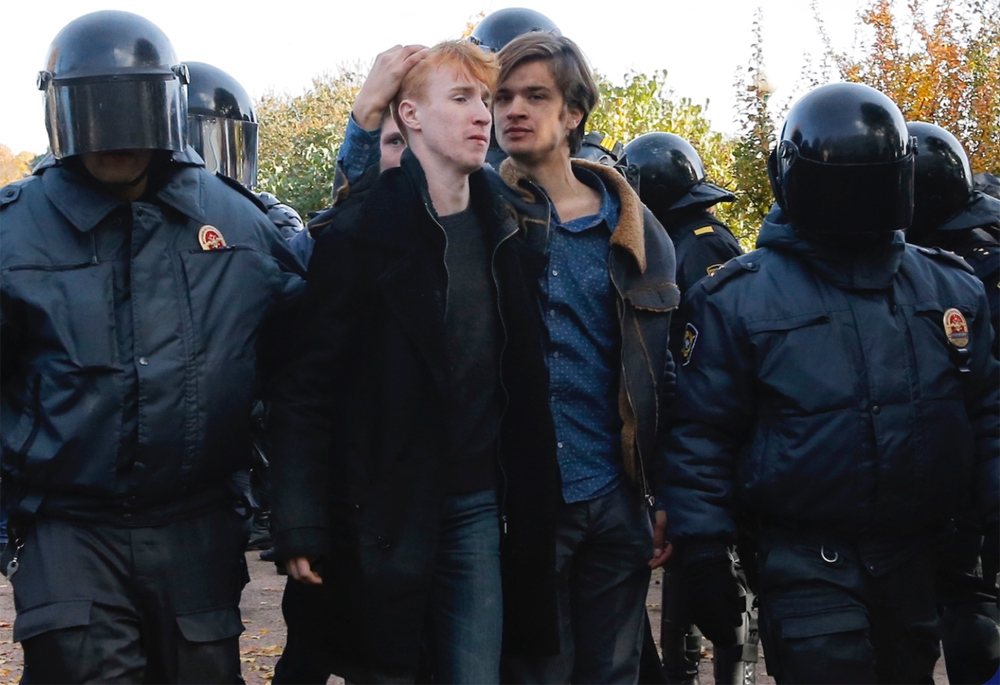
Figure 1 Riot police detain gay rights demonstrators during an LGBT rally in St Petersburg, Russia, in 2013. Image: Photo/Dimitry Lovetsk
Download a print friendly version of the article [PDF, 12.5 MB): Queer Tango and the War in Ukraine: Actions and Re-actions in an Imperfect World by Ray Batchelor, April 2022.
Queer Tango and the War in Ukraine: Actions and Re-actions in an Imperfect World
Ray Batchelor
The war in Ukraine affects everything and everyone. How does it affect queer tango? Are we, who dance it, any different from anyone else in how we think, feel, act, and respond? Can we make a difference? And what, if anything, should mark our responses out? To outsiders, the juxtaposition – war and queer tango – might seem in poor taste. The war is lethal, bloody, violent, and relentless, with thousands dead, injured, uprooted, or otherwise threatened. The dancing, even if queer tango has a political edge which chiefly, but not exclusively, addresses issues of gender, sexuality, and identity, is just dancing, isn’t it? The outsider might ask, is there any point in connecting the two right now?
There is. While the needs of people suffering the consequences of this carnage are immediate and demand from us urgent, compassionate, practical action, we are a community with particular insights. Also, I think for us, as with everyone else, there is value in our acknowledging a little of how we got here in the first place. I suggest we need a coherent, working view of the war to enable us both to reflect on why we are doing what we do now, and to plan what we might do in future. To date, queer tango responses can probably be divided into three kinds: those which spring from our sense of common humanity which we share with [almost] everyone else; those arising from our queer perspectives and a desire to help “people like us”; and finally, those few actions informed by our particular sensibilities developed on the queer tango dance floor. All three can coexist in one activity. They are not mutually exclusive.
There can never be enough resources to support actions addressing the suffering, yet resources are finite. For everyone’s sakes, we should be strategic and well-informed about what we are doing and why, that is, for us to match the efforts of others where the magnitude of the task justifies it, but also to support particular groups facing persecution, where some people’s suffering might otherwise be overlooked.
What follows is a sketch of the background to the war, of the key issues, of initial queer tango responses, and of some speculations for the future. I make no claims to much expertise in this field; indeed, I apologise for this, my exercise in “catch up”. I have some knowledge of queer tango, yet even with this, not least in regard to actions taken since the war broke out, others of you will know more. This is not a summative pronouncement, but my open-ended contribution to a conversation already underway.
Who is “queer tango”?
As we are talking about actions and it is people who act, this is a pertinent question. Queer tango as a community of dancers is not a homogenous entity. Some, like us in London, are geographically remote from the war, supporting our local communities with perhaps some individuals among us who have personal links to it, and so insights into the conflict. We may be remote, but we are also part of an international queer tango community. We may be in touch both with those geographically closer to the fighting and its consequences such as those in Germany, Poland and elsewhere, as well as with those still more remote from it all in north America, or Argentina and Uruguay.
How serious is this war?
I write from when and where I am, here in London on 4th April 2022. Whatever I write will be out of date by the time you read this, because events are moving fast. It seemed as if the wall-to-wall media coverage following the outbreak of the war had given way to intermittent reporting. News thrives on change, the more dramatic, the better. Changes in this protracted war seemed less easily identified and less certainly characterised than they were, and other news items returned to compete for my attention. But not today. Horrific accounts of the Russian withdrawal from Bucha complete with images of bodies flattened by tanks as if they were rugs, of torture chambers, of rape, become stories in my newspaper filling seven pages.[1]
How am I to make sense of this? Born in 1954, I grew up as a child unaware of the Cuban missile crisis in 1961, hearing of it later from those who were older. I heard about the Second World War all the time though not, as children do now, in history classes at school, because in the 1960s it was not quite “history”. I heard about it from the personal experiences of my mum and dad, of my aunts and uncles, and their contemporaries whose lives it was. Mindful that grandfathers and fathers had fought in World Wars 1 and 2 respectively, I think my post-war generation thought that we had escaped that cycle, that for us, the danger of another world war had passed. For the first time in my life, I am now less certain, even if my anxieties are mostly for those younger than myself. I agree with the consensus view that the war in Ukraine is the most serious rupture in world peace since 1945.
Whose side are we on?
We must support Ukraine – but we must also ask questions.
We in the west believe we see a socially liberal, democratic, Europe-facing Ukraine, led by an eloquent, passionate – and let it be said, social media savvy – Volodymyr Zelensky, an attractive David pitched against the Russian Goliath of puffy-faced Putin, the unstable, deranged megalomaniac heading a vast, overtly homophobic, oppressive, autocratic regime, hostile to freedom of speech. Yet this vivid portrayal is based largely on powerful evidence from Ukraine itself and from its supporters, with precious little coming out of Russia. In despising what Putin is doing, we need some knowledge of how things came to be like this, as well as acknowledging that his is not a complete representation of his country. One day our countries will need to re-engage with Russia and with Russians if still more war is to be avoided.[2] This war is a tragedy for Russians, as well as for Ukrainians.
Those of us coming late to this story must acknowledge some of the ambiguous histories which have led to it. Hands up those who, before the Russian invasion, knew much about the civil war raging since 2014 between Ukrainians and Russians in the Donbas region of the country? Well done if you did. To my shame, like millions of others, I did not. Among countless other serious stories competing for my attention, it had failed to register. Inconveniently for those who want to take a simple view of this conflict, the French journalist and filmmaker, Anne-Laure Bonnel, has documented how Volodymyr Zelensky’s predecessor as Ukrainian Premier, Petro Poroschenko, traded in populist, racist, anti-Russian hatred every bit as poisonous as the other brands pushed by his illiberal European counterparts in Hungary, Poland, Germany and France. As a prelude to the present conflict with, according to Bonnel, transgressions on both sides, the war in Donbas has not been a simple or “attractive” fight between good and bad. Put bluntly, historically, Ukraine’s liberal credentials are not spotless, even if, in the present context, they remain superior to those of Russia.
Has America helped cause this war, antagonising Russia by trying to turn Ukraine into an American-friendly, liberal democracy? There are those who argue it has. Tariq Ali cites in particular President Biden’s miscalculation in November 2021 that starting the process by which Ukraine might join NATO would check Russian expansionist ambitions towards the territory. It had very much the reverse effect.[3] I was shocked to learn from Buenos Aires contacts that many there on the left – including LGBTQ activists and some queer tango dancers – demonise the U.S., seeing Ukraine as no more than an American puppet, supporting instead Russia, America’s historic enemy, as the wronged party. In fairness, while they may be geographically far away from these events, they are closer to the U.S. and, arguably, have themselves been victims in their own country of murky covert American operations. Yet anti-Americanism, a habitual trope of the left, may be of little relevance in the context of this war other than to strike a cautionary note. The extent to which many Ukrainian people might have shared some of America’s ambitions for them is unambiguously demonstrated by the ferocious opposition they are now mounting against the Russian invasion. Indeed, whatever its immediate effects, contrary to Putin’s aspirations for the country – and Ali acknowledges as much – this war may ultimately accelerate a shift in precisely that direction among its people, including among Ukrainian Russian-speakers, some half of the country’s electorate, whose previously benign attitude towards Russia has been all but been destroyed by the Russian violence confronting them on a daily basis. [4]
To what extent is this war about LGBTQ rights?
Bluntly – and surprisingly to some – massively.
According to an article published on 7th March 2022 in the American LGBTQ-interest magazine The Advocate, a recent headline in the pro-Kremlin Russian newspaper, The Moscow Times, read “Pride Parade Caused Russia-Ukraine War says Russian Church Leader”.[5] The previous Sunday, Patriarch Kirill, Head of Russia’s Orthodox Church, gave a sermon:
For eight years there have been attempts to destroy what exists in Donbas. Donbas has fundamentally refused to accept the so-called values that are being offered by those aspiring for worldwide power. There is a specific test of loyalty to these powers, a requirement for being permitted into the happy world of excessive consuming and apparent freedom. This test is very straightforward and at the same time horrifying—the gay parade. The demand to organize a gay parade is a test of loyalty to this powerful world. And we know that if a people or a country refuses this test, they are not considered part of that world, they are considered as aliens to it… Therefore, what is happening today in international relations [the Russian invasion of Ukraine] does not only have political meaning. It is about something different and much more important than politics. It is about human salvation, about on which side of God the Savior humankind will end up.[6]
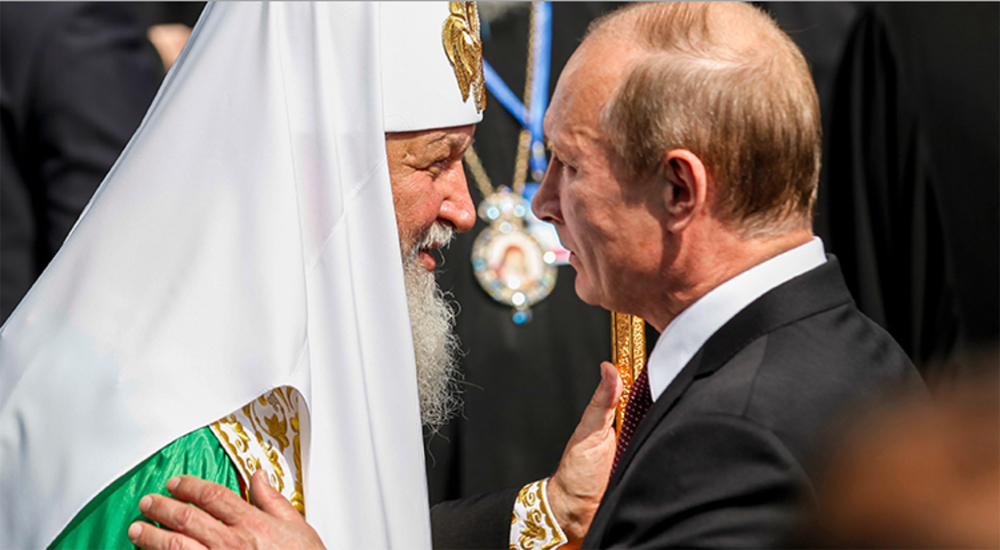
Figure 2 Patriarch Kirill, Head of Russia’s Orthodox Church with Vladimir Putin.
The Russian Orthodox Church has been a close ally of Putin for several years. According to Emil Edenborg, Associate Professor of Gender Studies at Stockholm University, “In the rhetoric of the Kremlin and state-loyal media, LGBT rights, feminism, multiculturalism, and atheism are identified not only as foreign to Russia’s values, but as existential threats to the nation.” Mapping this value system onto the nation’s geography justifies this war. Edenborg goes further. He not only sets this apparently conventional expression of religious homophobic bigotry into the context of Russian history stretching back into the Soviet era and beyond, but also notes its contemporary alignment with the views of Putin’s far right populist counterparts elsewhere in the world. He may not direct Viktor Orban in Hungary (re-elected with a whacking majority) or Jair Bolsonaro in Brazil, and others, but Putin is often seen as their global leader. Viewing LGBTQ rights as alien to national identity can not only be used to vindicate external warfare but also justify internal repression of the nation’s “enemy within”. Notoriously, Russia’s 2013 legislation outlawing “propaganda for promoting non-traditional sexual relationships” epitomised the homophobia normalised in national discourse.
LGBTQ rights are, if not at the centre of this war, then somewhere very close to it. We all have an interest in its outcome, and in the fates of those who are like us, but for whom the war has more direct effects.
How LGBTQ-friendly is Volodymyr Zelensky?
Writing before the war in November 2021, Soso Dzamukashvili argued that the euphoria with which LGBTQ people had greeted Volodymyr Zelensky’s election in spring 2019 was not subsequently matched by his pushing forward the LGBTQ reforms initiated by his predecessor, Poroshenko. Poroshenko sought to align the laws of Ukraine with those of the EU. [7] But, to put it mildly, Zelensky has had a lot on his plate. Before the war, to his credit, he famously shut down a homophobic heckler in 2019 in a moment which went viral.[8] And on April 1st 2022, in stark contrast to Putin’s pathological hostility – not to mention, on that same day, the pitiful fumblings of the UK government in failing to launch legal protection for trans people from “Conversion Therapy” – Volodymyr Zelensky, who is in the middle of fighting an existential war, said on Twitter:
On the day of the visibility of transgender people, do not forget that trans*people, trans*women and non-binary people…naturally fight on the front lines, [and] volunteer, [to] protect Ukraine…Together for Ukraine! Glory to the nation! [9]
How LGBTQ-friendly was/is Ukraine?
In September 2021, 7000 people marched in Kyiv in Ukraine’s annual March for [LGBTQ} Equality. In a statement, the marchers said:
We’ve grown tired of waiting for change and enduring systematic intimidation, pressure, disruption of peaceful events, attacks on activists and the LGBT community…We demand changes here and now, as we want to live freely in our own country.[10]
Plainly, issues to be addressed, but note the freedom to march (Moscow courts banned gay pride marches “for 100 years” in 2012[11]) and the freedom to address them. But that was before the war. Now, the war may have laid bare some disturbing attitudes affecting Ukrainian trans people. Lenny Emson, an LGBTQ activist in Ukraine, is reported in the New York Times as saying:
…some people who are L.G.B.T.Q. have faced problems unique to their sex or gender identity. Mx. Emson said that she was aware of about 100 transgender women who were in the process of attaining legal gender recognition when the war started. After the invasion, Ukraine banned men between the ages of 18 and 60 from leaving the country to ensure they could be conscripted for military service. The transgender women are effectively trapped “because of the letter ‘M’ in their passports,” Mx. Emson said. [12]
It is perfectly possible – credible, even – that these reports are true. Yet this war has seen a battle between different versions of “the truth” and LGBTQ issues are not immune from acting as vehicles for manipulation. Ukraine Pride recently felt compelled to issue a statement asserting that “International media in the wartime are spreading harmful misinformation about transgender rights and gender dysphoria treatment in Ukraine…” [13]
Zelensky praised trans people fighting in the war, but support is coming the whole of the LGBTQ community. On February 24th – the day the Russians invaded Ukraine – KyivPride posted on Twitter:
Putin will break all his teeth trying to bite us. We have left far behind the past to which he seeks to draw us. We are a country that has chosen the values of human rights, humanity, life and personality.
Putin lives in the past, he has a place there.[14]
According to an article by Jamie Wareham, a journalist on the ground in Ukraine, Vlad Shast, aged 26…
…Once known for a drag act…is now using his contacts as a stylist to help the army find materials and supplies.
[Shast says] “If Russia wins, it means darkness. There will be no freedom, no opportunity to be yourself, no rights for diverse communities.”
He adds:
“It was tough to be LGBTQ in Ukraine, even before the war. The country’s religious society has a high level of anti-LGBTQ sentiment. Despite this, Ukraine was a refuge for eastern European LGBTQ people, who had to flee their countries” [15]
As an LGBTQ soldier, Shast is not alone. Wareham’s account of his activities is a timely reminder that we would be quite wrong to think of LGBTQ people in this conflict solely as victims. Thousands of them have chosen to fight. Paul Bavloc recently reported in Siegesäule (“We are Queer Berlin”), the Berlin-based queer magazine:
The NGO UkrainePride used to host parties and last year [hosted] a queer rave protest against LGBTIQ* hate crimes and campaigned for an anti-discrimination law. Meanwhile, members of UkrainePride have joined the active defense of the country.
On their social channels, instead of protest or party pictures, you can now see queer people posing with heavy weapons. They have networked with other groups such as the LGBT Military initiative, which was founded in 2018 and [who] also took part in the Kyiv Pride. Their symbol is a unicorn, which they wear on their uniform.[16]
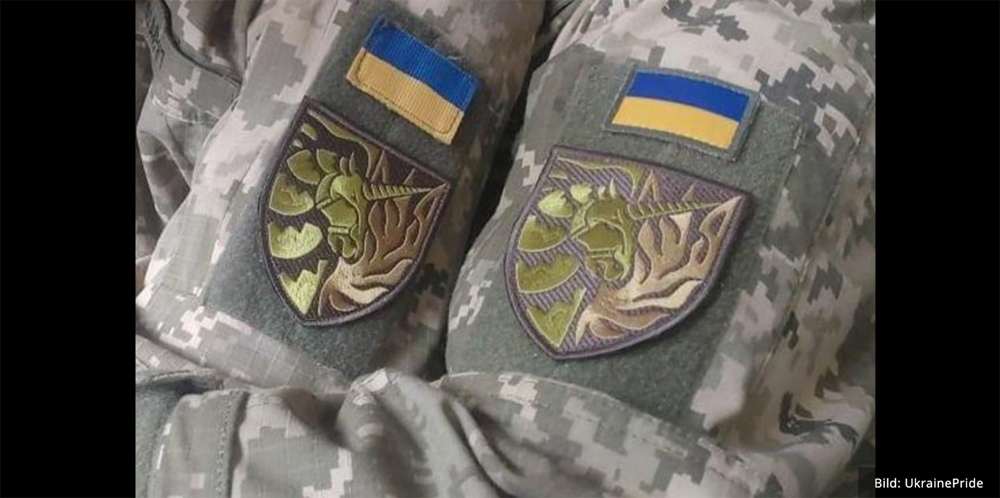
Figure 3 Founded in 2018, the LGBT Military Initiative has been joined by others as they fight the Russian invasion as Ukrainian soldiers. The unicorn is their symbol. Image: UkrainePride
What was the motivation for UkrainePride to join the country’s military defense?
We don’t want to live in a Ukraine dominated by the shameful Russian government and its laws. We don’t want to flee abroad. Our relatives and our friends live here. Therefore, we cannot just stand aside and wait while our brothers and sisters fight for our freedom. We act too.[17]
Given the historical hostility towards LGBTQ people in the military, the Team was asked if they faced prejudice: “We have a common goal and a common enemy. It’s not about categorizations like nationality, skin colour, gender identity or sexual orientation.” Paradoxically, eradicating aspects of the homophobia Putin seeks to promote has made his enemy, the Ukrainian army, stronger.[18]
How queer tango has responded to the war
I apologise for the gaps in this interim account. They are caused by ignorance and not for want of searching.
For those remote from the conflict, fundraising is the default response. It translates a desire to help into money, which is a flexible resource made available to those we trust to channel it towards addressing suffering to maximum effect. And, given that the needs are immediate, it is easy and quick to organise. Queer Tango London (QTL) held a fundraising milonga, “Dancing Queer to Support Ukraine” on 11th March 2022, with all QTL’s profits going to the Disaster Emergency Committee’s (DEC) Ukrainian Humanitarian Appeal – which has raised £260 million to date.[19]
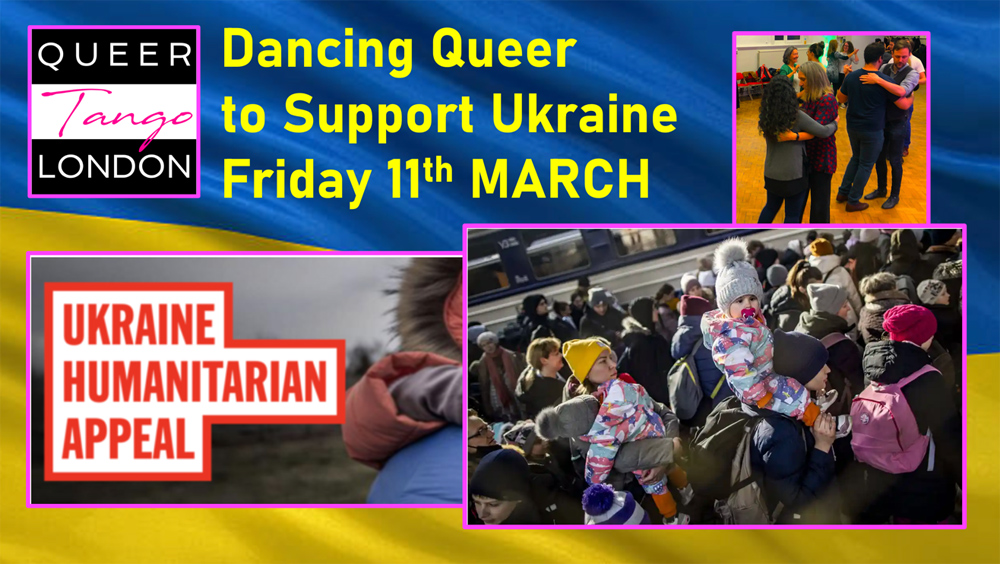
Figure 4 Queer Tango London’s fundraising milonga for the Disaster Emergencies Committee Ukraine Humanitarian Appeal.
The long-established, Berlin-based, Russian-speaking LGBTQ charity, Quarteera – with whom queer tango activist Wanja Kilber is associated – launched a fresh appeal, as explained in text accompanying a podcast they recorded:[20]
Wanja is involved in the Quarteera refugee aid. Before the interview he was at Berlin Central Station. “Helping helps,” he says several times in the podcast. “The willingness to help is enormous. It helps me to sleep at night.” According to Wanja, 175 people and 18 pets have already found a temporary home through Quarteera’s commitment alone. At the same time, the Queere Bündnis Nothilfe is sending HIV medication and hormone preparations for trans people, both of which are now in short supply, to Ukraine.[21]
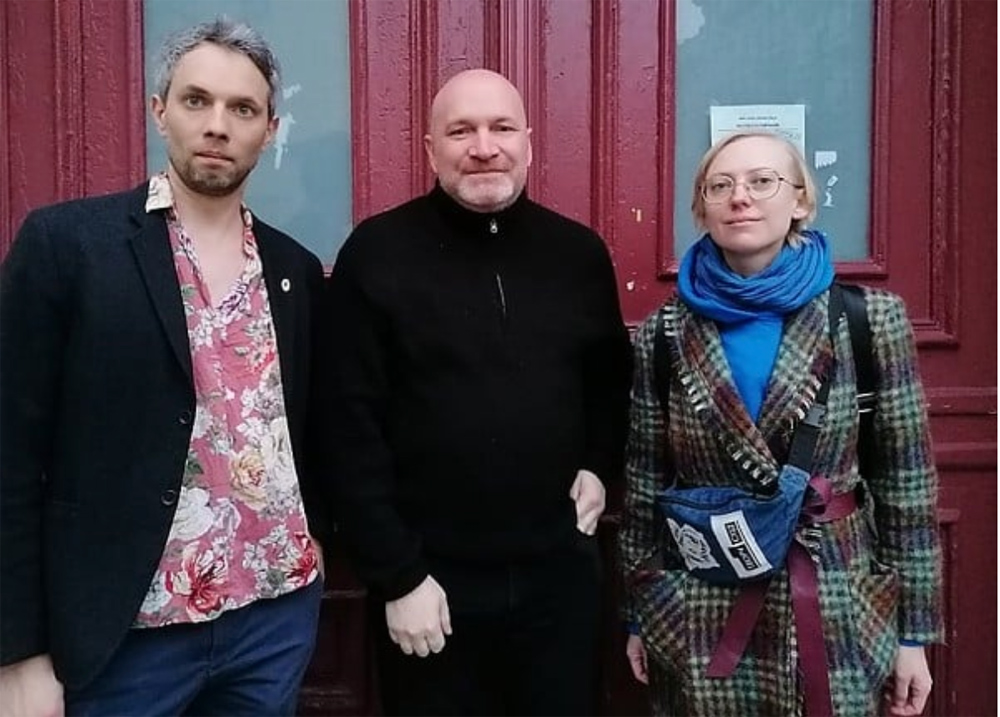
Figure 5 From Left to right: Wanja Kilber, Johannes Kram and Inga Pylypchuk from Quarteera, a charity aimed at supporting Russian-speaking queer people.
Though not impossible elsewhere, some forms of direct action are more practical for those closest to Ukraine. Quarteera is acting as an agency linking those with accommodation to offer with LGBTQ refugees who need it, as well as offering many other practical forms of help.[22] In Rome, the popular deGENERE queer tango festival, re-surfacing after Covid and scheduled long before the war for March 2022, held a fundraiser for Quarteera. In Belgium, Tony Damen organised a “Milonga de los Chicos” to raise money for Ukraine.[23] Lukas Engelmann, another Berlin-based queer tango activist, personally ferried eight LGBTQ refugees from Ukraine to Germany and safety.[24] Like Wanja Kilber, Lukas also believes helping helps the helper:
Actually, I have to [admit], it helps me to.. I need to do something! Otherwhise I feel like falling Apart…[25]
What next?
Only a fool would claim to be able to predict the future with any certainty. Paul Bavloc asked the Ukraine Pride Team “What support do LGBTIQ* people need in Ukraine?” and received the answer:
None of us knows exactly when the war in Ukraine will end. Funds raised by NGO UkrainePride will be used to support LGBTIQ* in the military and queer communities affected by the war.
twitter.com/UKRAINE_PRIDE_
instagram.com/ukraine.pride
Anyone who would like to support UkrainePride financially can do so in the following ways – the donated money [will] be invested in protective equipment, and the bereaved and families of the injured [will] also be supported:
monobank
4441 1144 5311 1369
IBAN: UA123220010000026205315732562
Sofia Lapina
PayPal: +14152799995
BTC: bc1qst3w3adx2hls7xu6ztkuugyphqhec56yl9sn87
ETH: 0x451Cfd3Fd63CE31b3b97fF7Bcc7f34ff03Cb47DC
#War#Ukraine#LGBTIQ*#Defense#Military [26]
I reproduce their answer in full in case anyone reading this is minded to donate, because this much is clear: these needs are going to be with us for the weeks, months – and possibly years – ahead, and with that, our obligation to act, or to contribute will remain. (I have made small donations to all the activities mentioned in this paper. Please use the links if you want to support any of them as well).
QTL, in a move intended to address this sustained demand for funds has launched the FRACTION for FREEDOM scheme. Under it, from now on, QTL donates 10% of its profits to charities addressing the sufferings of those affected by the war. QTL may shift its support from the highly credible, but general humanitarian work of the DEC Ukraine Humanitarian Appeal to a more specifically LGBTQ charity, such as the UK-based, AllOut,[27] or as its name implies the international charity Outright International:
Through [until] the end of April 2022, 100% of donations to OutRight’s Ukraine Fund are being disbursed directly to local LGBTIQ partners supporting our community in Ukraine and neighboring countries. Contributions are providing emergency assistance to LGBTIQ people who need safe shelter, food, competent medical care, transportation for those who are fleeing, and other types of humanitarian support.[28] [emphasis in the source]
QTL invites other tango organisations in London to join FRACTION for FREEDOM and to support charities of their own choosing. That said, we are mindful that, whereas we organise on a voluntary, non-profit basis with the luxury of incomes generated in other ways, our professional London tango colleagues, for whom we have the greatest respect, are struggling, post-Covid, to make their livings out of dance. Now, just as the prices of everything are beginning to rocket because of the war, we understand completely if they elect not to follow suit.
Even so, several have also run fundraisers, including the long-established, widely respected Corrientes:
Corrientes Solidarity with the humanitarian crisis in Ukraine. All net proceeds from this Saturday March 26 Corrientes@ChalkFarm will go to support Action Aid UK efforts at Ukraine’s borders, providing immediate humanitarian relief, specially to women and children[29]
A new, and friendly South London venue, Tango Café @ Fresh Ground also ran a fundraiser, and co-organiser, Katerina Stoyanova has signed the group up to FRACTION for FREEDOM.[30]
It may work. It may not. I am guessing we will all continue to try to do something and will continue to make it up as we go along, changing what we do as perceived needs alter.
…and the dancing?
Beyond providing a network of links between individuals and organisations minded to help, and holding milongas as fundraisers, just as others with other interests do, it might seem as if there is nothing happening which is peculiarly “queer tango” about our responses, let alone anything directly informed by queer tango dancing.
And yet, I argue, the dancing matters. At the risk of being found guilty of naivety or wishful thinking, I believe that we can and should dance, because each time we dance queer tango, we are maintaining and strengthening a model of social and political relationships, of inclusivity, of peaceful coexistence, and we are celebrating differences. By dancing, we make this model available to the world. In doing so, we embody a living rebuke to the warmongers fostering and exploiting differences to secure power, and offer instead a real, beautiful alternative to the ignorant homophobia traded by craven, power-seeking church leaders and politicians alike. Finally, we are keeping alive a vibrant point of reference, a sign of hope for those who are like us, and who, like us, want to live peaceful, joyous, and fulfilling lives. Perverse as it may seem to some, the worse this war gets, the more it matters that we dance queer tango, that we generate profound joy, and that we keep on doing so, again, and again, and again, no matter what.
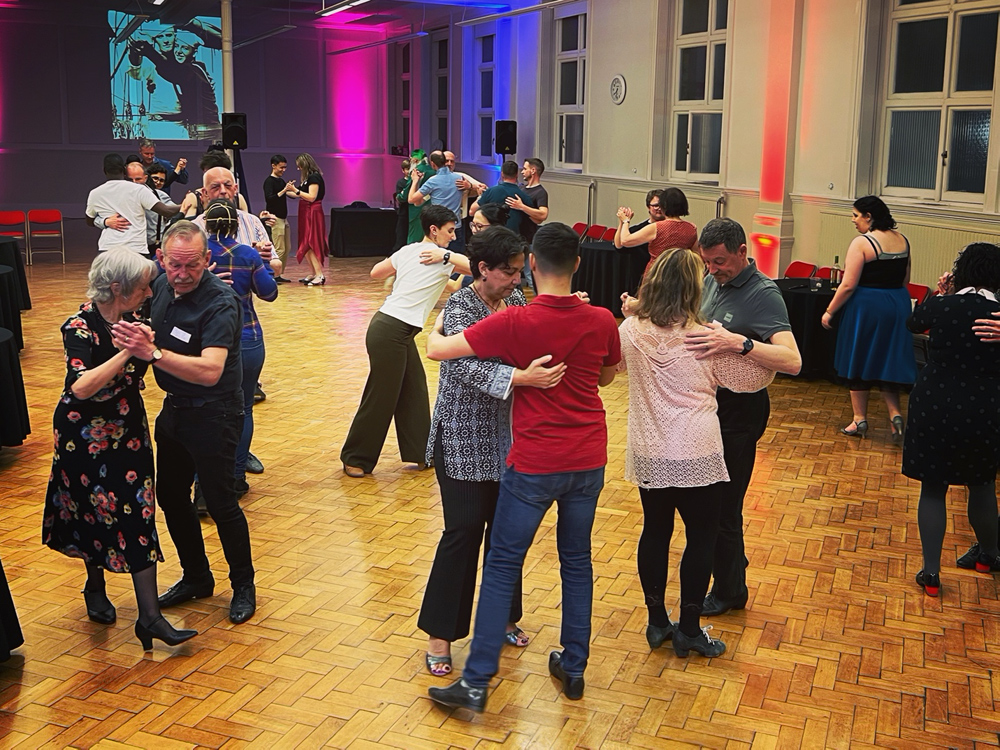
Figure 6 Queer tango danced in London, but it could be anywhere in the world where people are free to dance it. More than ever – as well as all other forms of action – we should dance.
Notes
1 The Guardian, London, UK, pp. 1, 6-11
2 https://www.theguardian.com/commentisfree/2022/mar/10/war-west-russia-ukraine-kremlin
3 Tariq Ali, “Before the War” in The London Review of Books, 24th March 2022, p.28
4 https://www.newyorker.com/news/q-and-a/why-john-mearsheimer-blames-the-us-for-the-crisis-in-ukraine
5 https://www.advocate.com/world/2022/3/07/pride-parades-caused-russia-ukraine-war-says-russian-church-leader
6 https://bostonreview.net/articles/putins-anti-gay-war-on-ukraine/
7 Soso Dzamukashvili, “Despite its reformist agenda, Ukraine’s government shows little commitment to LGBT+ rights” Emerging Europe, website, November 17, 2021,
8 https://emerging-europe.com/news/despite-its-reformist-agenda-ukraines-government-shows-little-commitment-to-lgbt-rights/
9 www.pinknews.co.uk/2019/10/14/volodymyr-zelensky-ukraine-president-press-conference-heckler/
10 https://abcnews.go.com/International/wireStory/thousands-march-ukraine-lgbt-rights-safety-80107859
11 https://en.wikipedia.org/wiki/Moscow_Pride
12 https://www.nytimes.com/2022/03/17/world/russia-ukraine-queer-activists.html Emson prefers the non-binary prefix, Mx
13 https://mobile.twitter.com/KyivPride/status/1506921853843034112
14 https://www.pinknews.co.uk/2022/02/24/ukraine-russia-lgbt-kyiv-pride/
15 https://www.forbes.com/sites/jamiewareham/2022/03/16/ukrainian-lgbtq-soldiers-fight-against-darkness-of-russian-invasion/?sh=2eb748163177
16 https://www.siegessaeule.de/magazin/verteidigung-der-ukraine-lgbtiq-im-milit%C3%A4r/?fbclid=IwAR1jMj9-Pz2FWxFUmtxM_g-_T8M3ZBqi8a55maIGhSLWnIDFQHWgcft0j6k Google translation from German
17 As above.
18 As above.
19 https://www.dec.org.uk/appeal/ukraine-humanitarian-appeal
20 http://www.quarteera.de/
21 https://www.queer.de/detail.php?article_id=41463&fbclid=IwAR3ZcB0ozGOmeo-7vhb8bVRchlE6-6Wkae0WIVdeEtSB3DAitcHrCNrFYNQ Fractionally corrected Google Translation from German.
22 https://forms.monday.com/forms/3a804d649a50f8f3d31cb63c533f8d16?r=use1
23 https://www.facebook.com/photo?fbid=10159986229729357&set=a.10156495822234357
24 https://www.facebook.com/ray.batchelor2/posts/990808918191115:17
25 https://www.facebook.com/ray.batchelor2/posts/990808918191115:17
26 https://www.siegessaeule.de/magazin/verteidigung-der-ukraine-lgbtiq-im-milit%C3%A4r/?fbclid=IwAR1jMj9-Pz2FWxFUmtxM_g-_T8M3ZBqi8a55maIGhSLWnIDFQHWgcft0j6k Google translation from German
27 https://campaigns.allout.org/ukraine-fundraiser?utm_source=facebook&utm_medium=social_organic&utm_campaign=ukraine-fundraiser&fbclid=IwAR0uN0XD8om9-nt9URTnF4Pjv2IIR5KXp93KYG8LkvJmK32ixMoqvQ-diMU
28 https://outrightinternational.org/ukraine?fbclid=IwAR3XPiHCNJ5FivWiv-uPpL0qBw7pdIMTaqmRR2HweDrwglg0IMz0zsY6ye8
29 https://www.facebook.com/CorrientesArgentineTango.london/photos/a.1445649565531045/4755025551260080/ https://www.actionaid.org.uk/checkout/292765/complete
30 https://www.facebook.com/events/849700386429358?ref=newsfeed